Raising chickens can be a rewarding experience, whether you’re interested in producing eggs or meat, or just want some feathered companions in your backyard. If you live in Georgia, there are many breeds of chicken that are well-suited to the state’s humid subtropical climate.
There are a few things you should consider when choosing chicken breeds for Georgia:
- Climate: Georgia has a humid subtropical climate, with hot summers and mild winters. Choose breeds that are known for their ability to withstand heat and humidity, as well as cold temperatures during the winter.
- Purpose: Are you looking for chickens to produce eggs, or are you more interested in raising them for meat? Different breeds excel at different things, so consider what your primary goal is when selecting a breed.
- Egg production: If you’re interested in egg production, choose breeds that are known for their high egg output. Leghorns are a popular choice for this purpose, as they can lay up to 300 eggs per year.
- Meat quality: If you’re interested in raising chickens for meat, choose breeds that are known for their good meat quality. Some options to consider include Cornish Cross, Jersey Giants, and Plymouth Rocks.
- Hardiness: Choose breeds that are known for their hardiness and ability to withstand different conditions. This will help ensure that your chickens stay healthy and productive.
- Personal preferences: Finally, consider your own personal preferences when choosing a breed. Do you want chickens with a particular appearance, such as white feathers or colorful plumage? Do you want a breed with a docile personality, or are you looking for something more energetic?
There are many breeds of chicken that do well in Georgia’s climate. Some of the best-laying hens in Georgia are:
Rhode Island Red
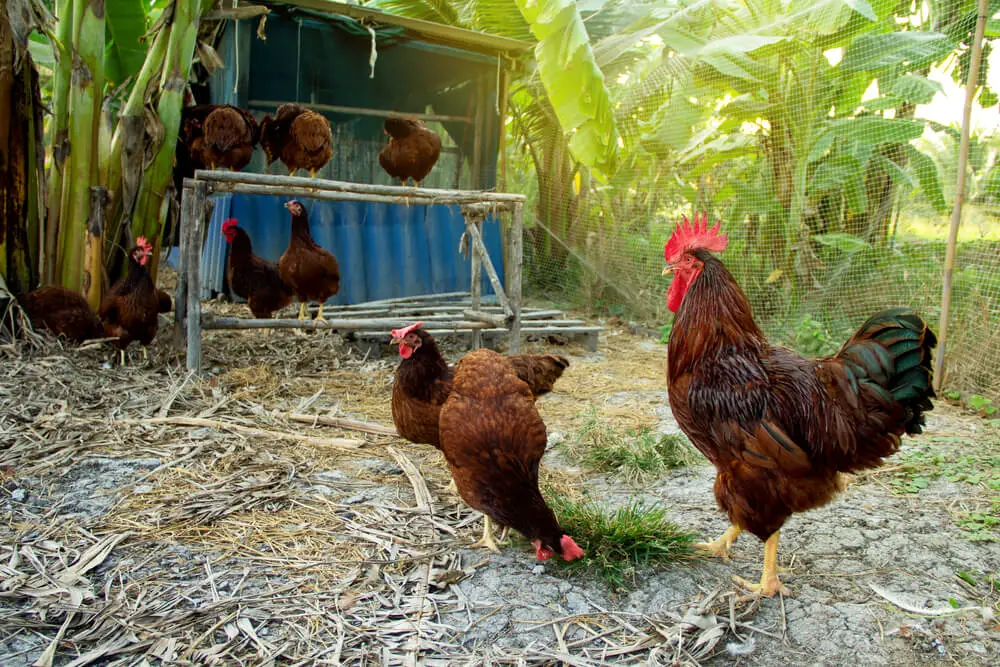
This breed is known for its red feathers and is a popular choice for both egg and meat production.
They are generally hardy and adapt well to different climates. Rhode Island Reds are good egg layers, producing around 250 brown eggs per year. They also have good meat quality, with plump and flavorful flesh.
Australorp
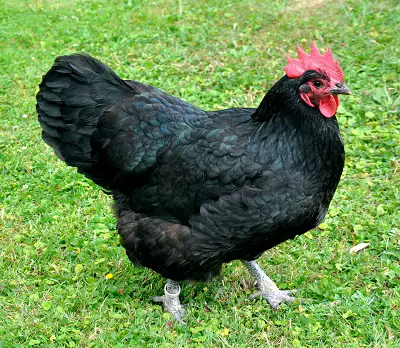
This breed is known for its black feathers and is native to Australia. It is a good egg layer, producing around 250 large, brown eggs per year.
Australorps are also known for their good meat quality, with tender and flavorful flesh. They are generally hardy and can tolerate hot temperatures well.
Sussex
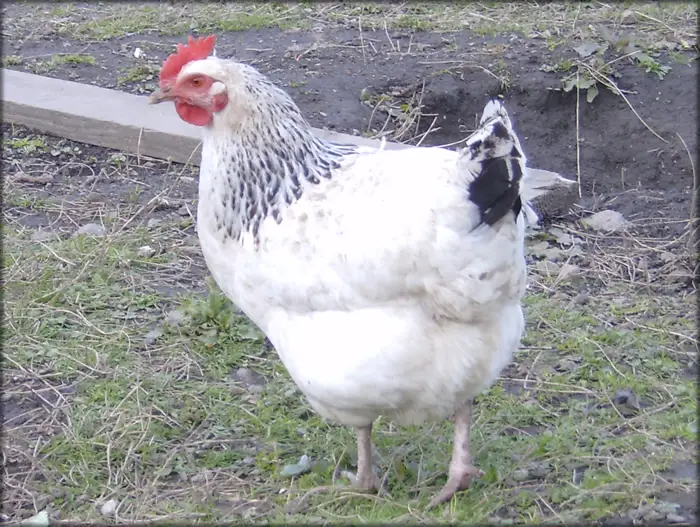
This breed is known for its light or dark brown feathers and is a popular choice for both egg and meat production.
They are generally hardy and adapt well to different climates. Sussex chickens are good egg layers, producing around 250 large, brown eggs per year. They also have good meat quality, with a plump and flavorful flesh.
Leghorn
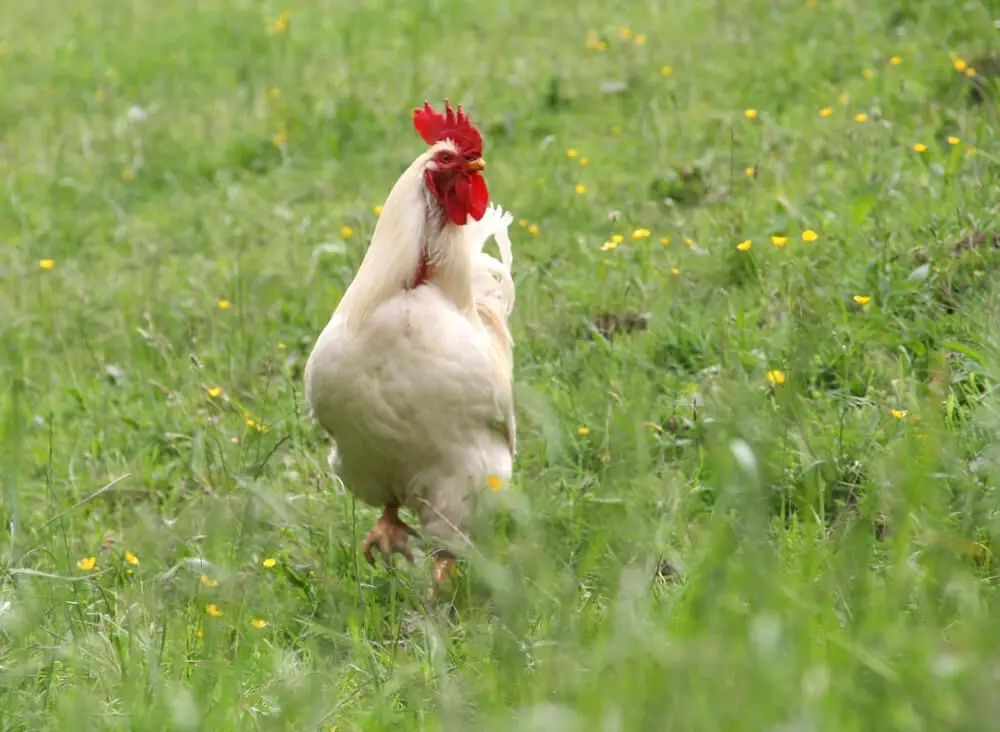
This breed is known for its white feathers and is a popular choice for egg production.
Leghorns are known for their high egg production, with some hens laying up to 300 eggs per year. They are generally active and energetic birds, and their white feathers make them easy to spot in the yard.
Plymouth Rock
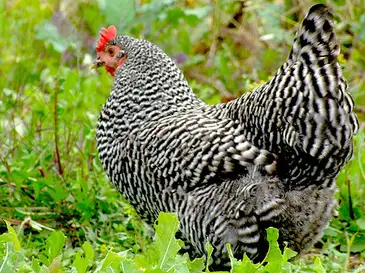
This breed is known for its barred (striped) feathers and is a popular choice for both egg and meat production. They are generally hardy and adapt well to different climates.
Plymouth Rocks are good egg layers, producing around 200 large, brown eggs per year. They also have good meat quality, with plump and flavorful flesh. They are known for their calm and docile personality and make good pets.
What predators are roaming through Georgia?
There are several predators that may pose a threat to chickens in Georgia, including:
- Coyotes: These carnivorous mammals are found throughout Georgia and are known to prey on chickens, especially if they are kept in unsecured enclosures.
- Raccoons: These omnivorous mammals are common in Georgia and are known to raid chicken coops and steal eggs.
- Foxes: These carnivorous mammals are found throughout Georgia and are known to prey on chickens, especially if they are kept in unsecured enclosures.
- Hawks and owls: These birds of prey are found throughout Georgia and may prey on small chickens or chicks.
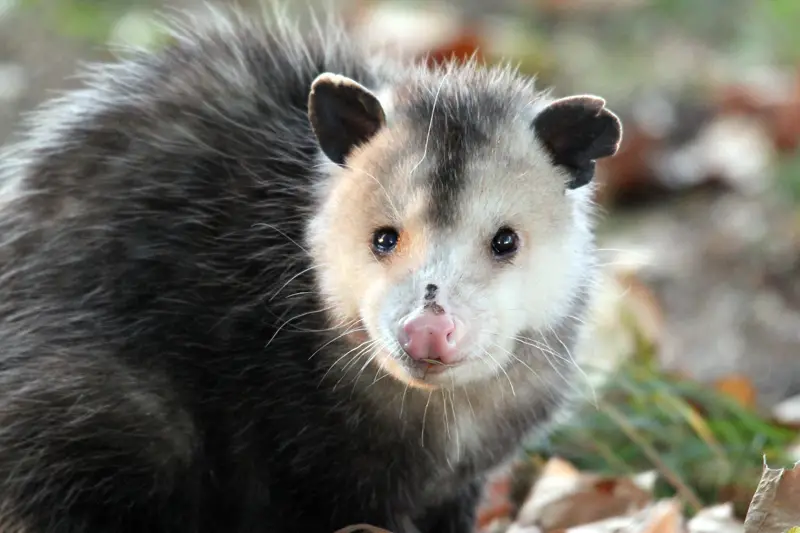
To protect your chickens from predators, it’s important to secure your chicken coop and run with sturdy fencing and a predator-proof latch. You can also use mesh wire or hardware cloth to cover any openings in the coop. It’s also a good idea to keep your chickens inside their coop at night, as most predators are more active during the hours of darkness. Finally, consider using motion-activated lights or alarm systems to deter predators from approaching your coop.
Chickens for sale in Georgia?
Here are some chicken hatcheries located in Georgia:
- The Chick Hatchery: This hatchery is located in Gainesville and sells a variety of chicken breeds, including bantams and ducks.
- Backyard Chickens: This hatchery is located in Barnesville and sells a variety of chicken breeds, including bantams and ducks.
- The Chicken Lady: This hatchery is located in Villa Rica and sells a variety of chicken breeds, including bantams and ducks.
- Georgia Backyard Chickens: This hatchery is located in Bremen and sells a variety of chicken breeds, including bantams and ducks.
- Coop Creek Farm: This hatchery is located in Bowdon and sells a variety of chicken breeds, including bantams and ducks.
It’s important to do some research and choose a reputable hatchery to ensure that you receive healthy, viable eggs. You may also want to consider purchasing eggs from a local farm or at a poultry show to support small businesses and to have a greater variety of breeds to choose from.
Where to buy chickens in South Georgia?
There are several places where you can buy chickens in South Georgia:
- Local farms: Many small farms in South Georgia sell chickens. You can search online directories or visit local farmers’ markets to find farms near you.
- Online hatcheries: There are many online hatcheries that sell chickens. Some options include Cackle Hatchery, Murray McMurray Hatchery, and My Pet Chicken.
- Local feed stores: Some local feed stores in South Georgia may sell chickens. It’s a good idea to call ahead to make sure they have chickens in stock.
- Poultry shows: Poultry shows are a great place to find chickens from a variety of breeds. You can search online for poultry shows in your area, or check with your local poultry association.
- Craigslist: You may be able to find chickens for sale on Craigslist. Just be sure to exercise caution when buying from an individual seller, as there is no guarantee of the health or quality of the chickens.
It’s important to do some research and choose a reputable source when purchasing chickens to ensure that you receive healthy, well-cared-for birds.
Georgia Chicken Laws?
It’s a good idea to familiarize yourself with the local laws and regulations regarding the keeping of chickens in Georgia. Here are a few things to keep in mind:
- Zoning laws: Some cities and counties in Georgia have zoning laws that regulate the keeping of chickens on residential properties. It’s a good idea to check with your local zoning office to find out what the laws are in your area.
- Building codes: Chickens must be housed in a coop that meets certain standards to protect them from the elements and predators. It’s a good idea to familiarize yourself with the building codes that apply to chicken coops in your area.
- Noise ordinances: Chickens can be loud, especially during the early morning hours. Some cities and counties in Georgia have noise ordinances that regulate the amount of noise that can be produced on residential properties. It’s a good idea to check with your local government to find out what the laws are in your area.
- Sanitation laws: Chickens produce waste that must be properly managed to prevent health and environmental problems. It’s a good idea to familiarize yourself with the sanitation laws that apply to chicken coops in your area.
It’s always a good idea to be a responsible chicken owner and to follow the laws and regulations that apply to the keeping of chickens in your area. This will help ensure that you and your chickens can coexist peacefully with your neighbors.
Conclusion
In conclusion, raising chickens can be a rewarding experience for those who live in Georgia.
There are many breeds of chicken that are well-suited to the state’s humid subtropical climate, including the Rhode Island Red, Australorp, Sussex, Leghorn, and Plymouth Rock.
When choosing a breed, it’s important to consider factors such as climate tolerance, egg or meat production, hardiness, and personal preferences. To protect your chickens from predators, it’s important to secure your chicken coop and run with sturdy fencing and a predator-proof latch.
You can also use mesh wire or hardware cloth to cover any openings in the coop, and keep your chickens inside their coop at night.
Finally, it’s important to familiarize yourself with the local laws and regulations regarding the keeping of chickens in Georgia, including zoning laws, building codes, noise ordinances, and sanitation laws.
With proper care and attention, your chickens can provide you with years of enjoyment and produce a bountiful supply of eggs or meat.
sources:
https://www.poultryventilation.com/resources/choosing-the-best-chicken-breed-for-your-flock/
https://www.backyardchickens.com/threads/what-are-the-best-layers-for-georgia-climate.9056/
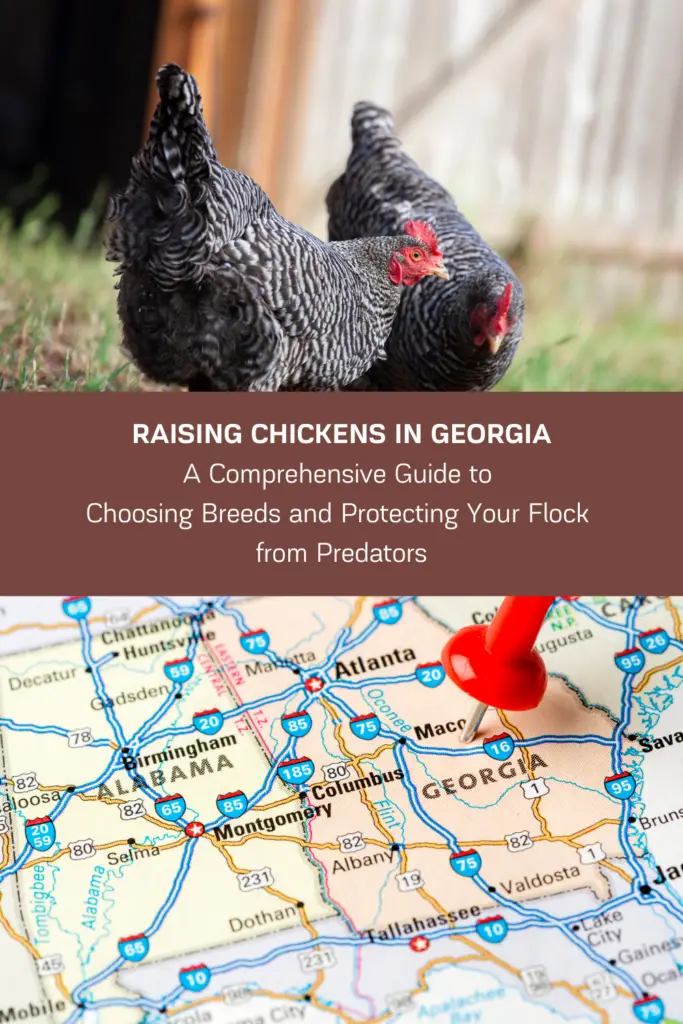
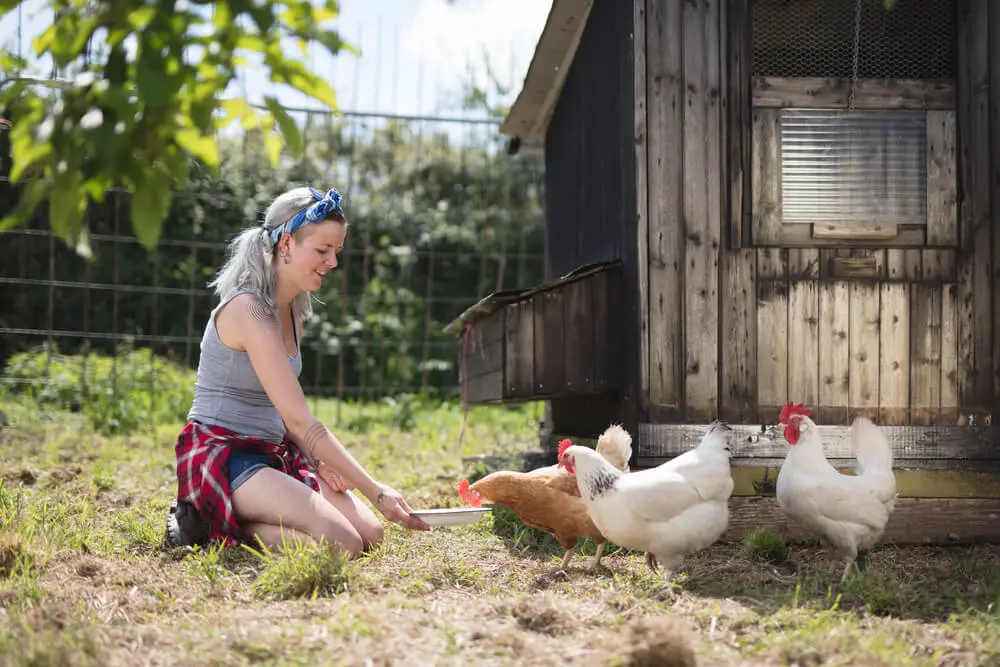
Shannon Stansberry has been engaged in the business of raising chickens for more than 12 years. In 2016, she accomplished the Agriculture & Natural Resources program at Mt. San Antonio College. At present, she tends to more than 80 chickens on her 4-hectare farm. Shannon regularly shares her insights and experience on how to raise healthy and contented chickens on the platform Typesofchickens.com

